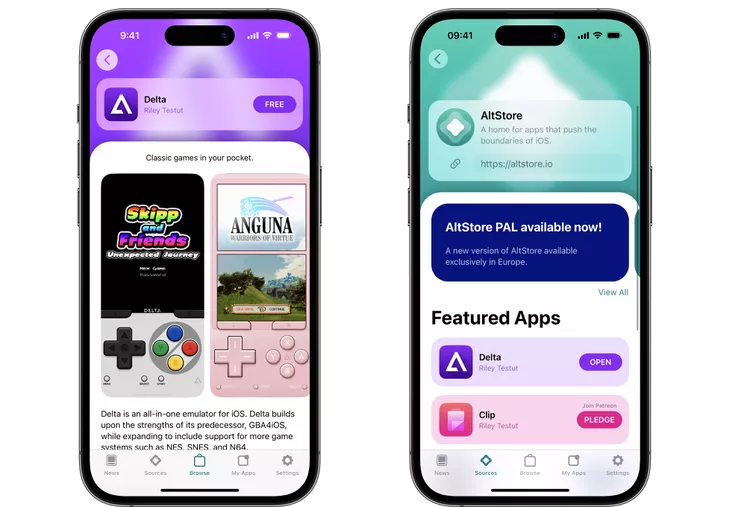- Software betas for Apple’s Mac, iPhone, and iPad have been made public.
- For iPhone users in the European Union, the most notable addition is the ability to download apps directly from the web.
- Soon enough, this must make its way to the United States.
There are a number of useful new features in the latest betas of iOS 17.5 and macOS 14.5 for the iPhone, iPad, and Mac, but the most exciting development is that people in Europe will soon be able to download iPhone apps from official websites.
While the power to “sideload” apps straight from websites is limited to the European Union and the iPhone, the new third-party tracker alerts, FaceTime enhancements, an iPad battery health readout, and the awesome new word game in Apple News are all accessible in the US—the iPad is still as locked down as before. While this is fantastic news for our iPhone-owning friends in the European Union, wouldn’t it be even better if Apple lifted its restrictions globally?
According to Jonathan Feniak, general counsel at LLC Attorney “the progressive conversation on tech regulation, and a parallel focus on expanding consumer choice, suggests a similar regulatory environment could develop in the US.”
Period of Update
Apple no longer releases all of its new features at once in the fall, but rather spreads them out throughout the year. This practice began a few years ago. This has previously resulted in major revisions in the middle of a product cycle, such as when Apple introduced the Magic Keyboard with trackpad and rethought the iPad’s compatibility with mice.
In principle, this means things may be released at their own pace, which is good for consumers and Apple because it means features can be more thoroughly tested and, hopefully, less prone to bugs.

Now that the beta version of these upcoming improvements is out, let’s have a look at some of the most notable changes before we go into side-loading. Quartiles, a brand new daily word game only to Apple News+ subscribers, is the most entertaining one. It’s housed inside the Apple News app.
Also, we receive notifications about third-party trackers, so if there are any questionable trackers using Google’s network, iPhone users will be notified. This makes it on par with Google’s own Find My Device network, which could already notify users of Apple’s AirTags when it released around a week ago.
As a user of FaceTime, you’ll soon be able to “block all participants” in a call—the digital analogue, I suppose, of hurling yourself out of a meeting.
Even iPad owners aren’t excluded. For example, we will have access to the same battery health metrics enjoyed by Mac and iPhone users, which will show us the percentage of the original maximum capacity that remains.
That’s all I need to say about it. Now, let’s talk about the App Store.
Idealistic Thinking
The DMA (Digital Markets Act) regulations enacted by the European Commission gradually wore down Apple by identifying large, important tech companies and requiring them to play by the rules. At first, Apple let EU residents use third-party app stores for their iPhones, but they continued to charge developers a hefty fee—50 Euro cents per user, per year (about $0.53)—once they met specific requirements.
You couldn’t build a store only for your programs since these app shops had to let other developers sell their wares via them. Additionally, you had to give Apple access to your financial records to ensure that you weren’t withholding any of “its” money.
After lengthy debate, the EC and Apple have reached an agreement wherein Apple will permit software companies to host downloads on their own websites.

Apps still need to go through Apple’s app approval process, despite your hopes to the contrary. In order to automatically copy text from your clipboard, Riley Testut, owner of the Alt Store, created an app called Clip. However, Apple nonetheless declined to “notarize” it due to a guideline violation—specifically, its background running—even though it is not available in the official App Store.
Apple maintains that its review process for the App Store safeguards users, but in practice, it frequently backfires. Due to our indoctrination into fully relying on the App Store, we are unprepared for the abundance of fraudulent apps that Apple really publishes there.
In a forum thread, Apple expert Sw1tcher claimed that, for years, “inexperienced users have been getting tricked into downloading apps that could expose their data, steal their credentials, and worse from Apple’s App Store.” Sw1tcher went on to list a laundry list of phony and scam apps that Apple has examined, approved, and included in its official App Store.
On the other hand, “sideloading” programs has been a perfectly acceptable practice for Mac users since 1984.
We can only hope that the United States will follow suit once Apple stops dragging its feet and does the moral thing. The finest part is that the entire European Union will prove to Apple that it is possible and secure, so the tech company can’t say such things.

